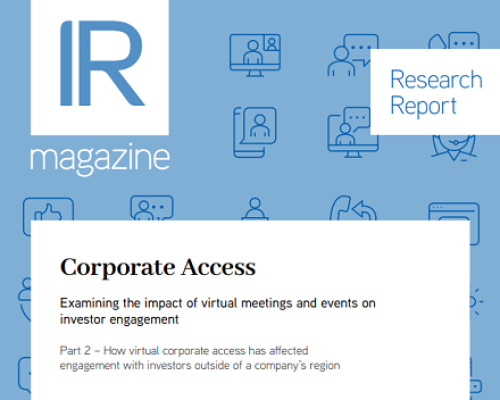'There couldn’t be a better time to increase access to management than during and after a challenging period'
This article was produced in association with ELITE Connect. It was originally published on the ELITE Connect platform
The investor landscape presents many opportunities for demanding times, which can negatively affect shareholder confidence. Not only are companies vulnerable to general market challenges – including regulation, commodity pricing and political implications – but company-specific threats, such as ESG issues, shareholder activism and employee negligence can also all have a detrimental effect on market perception.
IROs can play a vital role in rebuilding shareholder confidence following difficult periods, with one key tactic being to facilitate greater access to management, as Basak Kotler, director of IR for the Coca-Cola Hellenic Bottling Company and former head of IR at Balfour Beatty, explains.
‘Following a period of poor performance, for instance, management is often less than willing to engage with investors,’ he says. ‘But there couldn’t be a better time to increase access to management than during and after a challenging period. Depending on the nature of the challenge, getting the chairman and the senior independent director on the road may also help.’
Sandra Novakov, IR director at Citigate Dewe Rogerson, agrees. ‘Providing access to the chairman or other non-executive board directors may be reassuring to investors and could accelerate the rebuilding of trust,’ she points out.
Acting as a vital conduit between shareholders and the board, IROs can also play a key role in helping management to understand market perception, and should consider using external resources to assist the process.
‘The IR team can ensure executive management and their company board are aware of market perceptions with respect to both what went wrong during the time of crisis and expectations for the future,’ says Novakov. ‘In my view, the best way to achieve this is through an in-depth perception study conducted by an independent adviser. Taking this step both sends a signal to the market that the company values its investors’ views and ensures high levels of understanding internally regarding key issues and concerns to avoid further market disappointment.’
In times of real shareholder crisis, another consideration could be exploring new investor options. ‘If a number of the company’s shareholders have lost trust in the management team and sold out of the stock or reduced their position significantly, it can take several years for that trust to be rebuilt,’ comments Novakov.
‘In these circumstances, the IR team should review the shareholder base to determine whether a different type of investor may be worth targeting (such as funds specializing in turnaround situations or value investors that may recognize the company is oversold following its recent problems). Proactive investor targeting in general should be a priority in such circumstances, as investors new to the stock may be more willing to look past any recent issues.’
Looking forward, transparency and clarity are key to rebuilding confidence and addressing past concerns. ‘The IR team can ensure key messages in all information materials and Q&A documents address feedback received from the market,’ Novakov adds. ‘Past problems and/or investor concerns should be acknowledged by both the IR team and senior management during meetings and events, and key audiences should be educated on the actions taken to address these issues and the overall strategy for the future.’
Kotler also advises IROs to take a few simple steps to pave the way for effective communications. ‘Transparency is key, so it’s important to understand the market’s views, concerns and misconceptions, and respond in an open and honest way,’ he says. ‘IROs should always have a strategic medium-term plan in place, but if that plan is not understood or is not gaining traction, a road map of operational and financial targets may focus the market’s mind.
‘Some sell-side analysts and fund managers are seen as opinion leaders. Getting them on board early on may make the journey easier. Finally, while certain institutions or people have more influence and are good to focus on, there are thousands of institutions that IROs will not be able have personal contact with. For this audience, they should make their website, annual report and other material work hard.’










